I Always Feel Happy You Know Why Tell Me Onde Again Why You Cant Work

Nosotros all desire a happy life…
A cushy job, a perfect family, financial stability, and a great social life!
And in this indefinite pursuit of happiness that is mostly like a mirage, how often do we spare a minute to thank what nosotros already have at this very moment?
Gratitude is a powerful man emotion. By carrying and receiving elementary 'thank you' letters, nosotros can truly derive the pleasance that nosotros seek everywhere else. Gratitude, derived from the Latin give-and-take 'gratia', ways gratefulness or thankfulness.
In its simplest form, gratitude refers to a 'state of thankfulness' or a 'state of being grateful'.
Before you continue reading, we thought you might like to download our three Grief Exercises [PDF] for free. These science-based tools volition help you move yourself or others through grief in a empathetic way.
"Gratitude can transform common days into thanksgiving, turn routine jobs into joy, and change ordinary opportunities into blessings."
Proverb
In positive psychology, gratitude is the human way of acknowledging the skilful things of life. Psychologists have defined gratitude as a positive emotional response that we perceive on giving or receiving a benefit from someone (Emmons & McCullough, 2004).
A similar explanation was put along by Emmons and McCullough who said that:
"Gratitude is associated with a personal benefit that was non intentionally sought after, deserved, or earned but rather because of the practiced intentions of some other person" (Emmons & McCullough, 2004).
Thanking others, thanking ourselves, Mother Nature, or the Almighty – gratitude in any class tin enlighten the listen and make the states experience happier. It has a healing issue on us (Russell & Fosha, 2008). The benefits of gratitude are endless, and in this article, allow us endeavour to explore what gratitude it, discuss its scientific base, and empathize how we can use gratitude to exist happier in life.
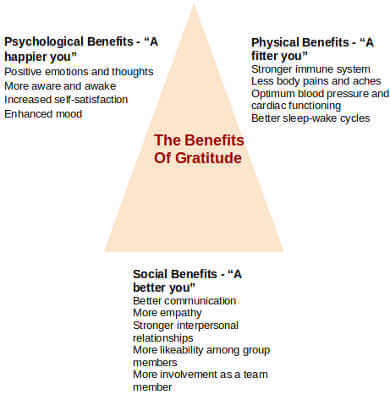
How Gratitude Works
"Savor the little things. For ane solar day yous may look back and realize they were the big things."
Robert Brault
Gratitude in all forms is associated with happiness. Whether we say 'thank you' to someone or receive the same from others, the feeling it brings is that of pure satisfaction and encouragement. Expressions of gratitude assistance in edifice and sustaining long term relationships, bargain with adversities and bounciness dorsum from them with strength and motivation.
Gratitude brings happiness
Gratitude improves interpersonal relationships at domicile and work (Gordon, Impett, Kogan, Oveis, & Keltner, 2012). The connection between gratitude and happiness is multi-dimensional. Expressing gratitude not only to others simply also to ourselves, induces positive emotions, primarily happiness. By producing feelings of pleasure and contentment, gratitude impacts on our overall health and well-existence as well.
In a survey on gratitude in adult professionals, British psychologist and wellness proficient Robert Holden found that 65 out of 100 people selected happiness over health, although they indicated that both were every bit of import for a good life. Holden, in his study, suggested that the roots of many psychopathological conditions like depression, feet, and stress are unhappiness.
Elementary practices like maintaining a gratitude journal, complimenting the cocky, or sending minor tokens and thanks notes can make us feel a lot better and enhance our mood immediately. Couple studies accept besides indicated that partners who expressed their thankfulness to each other oft, could sustain their relationships with common trust, loyalty, and had long-lasting happy relationships.
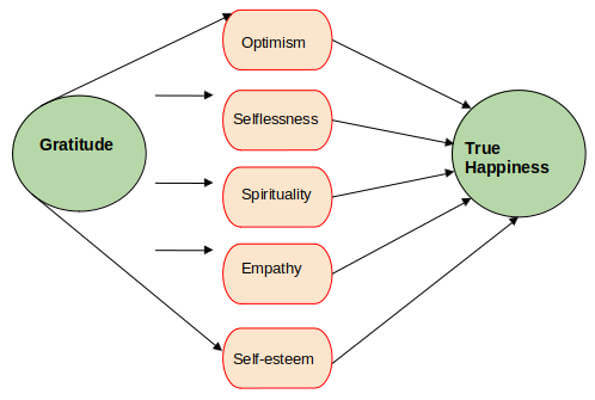
Gratitude improves health
Gratitude impacts on mental and concrete well-being. Positive psychology and mental health researchers in the past few decades take established an overwhelming connexion betwixt gratitude and good wellness. Keeping a gratitude periodical causes less stress, improves the quality of sleep, and builds emotional sensation (Seligman, Steen, Park, & Peterson, 2005).
Gratitude is positively correlated to more vitality, energy, and enthusiasm to work harder.
Gratitude builds professional commitment
Grateful workers are more efficient, more than productive and more than responsible. Expressing gratitude in the workplace is a proactive action toward edifice interpersonal bonds and trigger feelings of closeness and bonding (Algoe, 2012).
Employees who practise expressing gratitude at work are more likely to volunteer for more assignments, willing to take an extra step to accomplish their tasks, and happily work as a function of the team. Besides, managers and supervisors who feel grateful and remember to convey the same, have a stronger group cohesiveness and better productivity.
They recognize proficient work, gives everyone their due importance in the group and actively communicates with the team members.
Gratitude makes a leader compassionate, considerate, empathetic, and loved amid others.
The Neuroscientific Research Into Gratitude
"Gratitude is the healthiest of all human being emotions."
Zig Ziglar
Gratitude was pregnant in ancient philosophies and cultures, for case, in the Roman culture, where Cicero mentioned gratitude as the 'mother' of all human feelings. As an area of neuropsychological enquiry, withal, it was a rare bailiwick of concern until the last two decades (Emmons & McCullough, 2004).
Gratitude And The Brain
Neural mechanisms that are responsible for feelings of gratitude have grabbed attention (Wood, Maltby, Stewart, Linley, & Joseph, 2008). Studies accept demonstrated that at the brain level, moral judgments involving feelings of gratefulness are evoked in the correct anterior temporal cortex (Zahn et al., 2009).
In the same study, information technology was revealed that the reason why some of us are naturally more grateful than others, is the neurochemical differences at the Central Nervous Organisation. People who express and feel gratitude have a higher volume of grayness matter in the right inferior temporal gyrus (Zahn, Garrido, Moll, & Grafman, 2014).
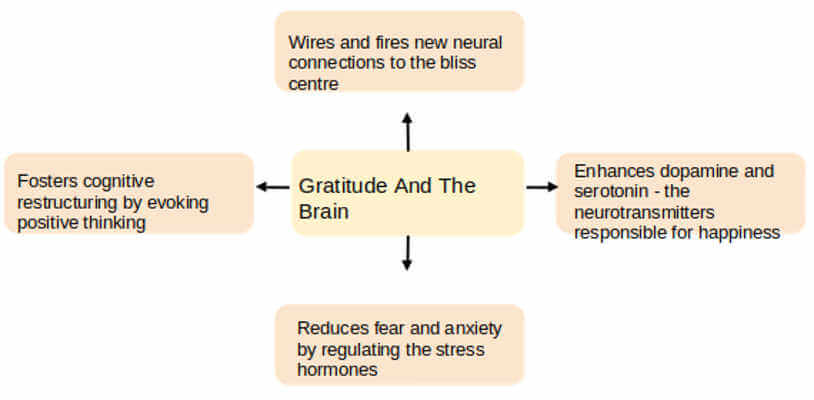
Gratitude And Neurotransmitters
Emily Fletcher, the founder of Ziva, a well-known meditation grooming site, mentioned in one of her publications that gratitude as a 'natural antidepressant'. The effects of gratitude, when practiced daily can be most the aforementioned as medications. Information technology produces a feeling of long-lasting happiness and delectation, the physiological basis of which lies at the neurotransmitter level.
When we limited gratitude and receive the same, our brain releases dopamine and serotonin, the two crucial neurotransmitters responsible for our emotions, and they brand united states feel 'adept'. They heighten our mood immediately, making the states feel happy from the inside.
By consciously practicing gratitude everyday, we can help these neural pathways to strengthen themselves and ultimately create a permanent grateful and positive nature within ourselves.
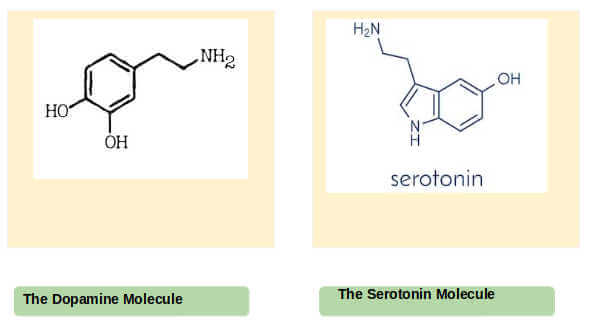
Gratitude And Social Psychology
Gratitude has a social aspect to it that argues it to be a socially driven emotion. Social psychologists believe it to be entwined with the perception of what we accept washed for others and what others have washed for us (Emmons & McNamara, 2006).
According to them, gratitude is an emotion that direct targets at edifice and sustaining social bondings (Algoe, Haidt, & Gable, 2008) and reinforce prosocial responses in the future (McCullough, Kimeldorf, & Cohen, 2008).
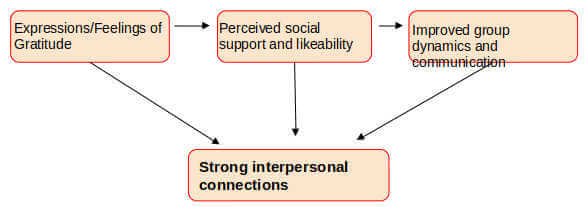
How Gratitude Affects the Brain
"It is not happiness that brings usa gratitude. It is gratitude that brings united states happiness."
Gratitude may be a gesture or a group of kind words that we give or receive from others. But these simple exchanges of thankfulness goes a long way in affecting our overall biological operation – especially the brain and the nervous system. The effect of gratitude on the brain is long lasting (Zahn et al., 2007).
Likewise enhancing self-honey and empathy, gratitude significantly impacts on trunk functions and psychological weather like stress, anxiety, and depression.
1. Gratitude releases toxic emotions
The limbic organisation is the part of the brain that is responsible for all emotional experiences. It consists of the thalamus, hypothalamus, amygdala, hippocampus, and cingulate gyrus. Studies have shown that hippocampus and amygdala, the 2 main sites regulating emotions, memory, and bodily functioning, get activated with feelings of gratitude.
Consistent evidence has established that what we phone call 'emotions' or 'feelings' are neural activations in the neocortical regions of the brain (Moll et al., 2005). A study conducted on individuals seeking mental health guidance revealed that participants of the group who wrote letters of gratitude besides their regular counseling sessions, felt better and recovered sooner.
The other group in the study that were asked to periodical their negative experiences instead of writing gratitude letters reported feelings of anxiety and depression.
2. Gratitude reduces hurting
Counting Blessings vs Burdens (Emmons & McCullough, 2003), a study conducted on evaluating the effect of gratitude on physical well-existence, indicated that 16% of the patients who kept a gratitude journal reported reduced pain symptoms and were more than willing to piece of work out and cooperate with the treatment procedure. A deeper dig into the cause unleashed that by regulating the level of dopamine, gratitude fills the states with more vitality, thereby reducing subjective feelings of pain.
3. Gratitude improves sleep quality
 Studies have shown that receiving and displaying simple acts of kindness activates the hypothalamus, and thereby regulates all bodily mechanisms controlled by the hypothalamus, out of which sleep is a vital i.
Studies have shown that receiving and displaying simple acts of kindness activates the hypothalamus, and thereby regulates all bodily mechanisms controlled by the hypothalamus, out of which sleep is a vital i.
Hypothalamic regulation triggered by gratitude helps us become deeper and healthier slumber naturally everyday. A brain filled with gratitude and kindness is more likely to slumber better and wake up feeling refreshed and energetic every morning (Zahn et al., 2009).
4. Gratitude aids in stress regulation
McCraty and colleagues (cited in McCraty & Childre, 2004), in one of their studies on gratitude and appreciation, found that participants who felt grateful showed a marked reduction in the level of cortisol, the stress hormone. They had better cardiac functioning and were more resilient to emotional setbacks and negative experiences.
Significant studies over the years have established the fact that past practicing gratitude we tin handle stress better than others. By but acknowledging and appreciating the lilliputian things in life, we can rewire the brain to deal with the nowadays circumstances with more than awareness and broader perception.
5. Gratitude reduces anxiety and low
By reducing the stress hormones and managing the autonomic nervous system functions, gratitude significantly reduces symptoms of low and feet. At the neurochemical level, feelings of gratitude are associated with an increase in the neural modulation of the prefrontal cortex, the brain site responsible for managing negative emotions like guilt, shame, and violence.
As a result, people who keep a gratitude journal or use exact expressions for the same, are more empathetic and positive minded past nature.
Does Gratitude Modify the Brain?
The Mindfulness Sensation Inquiry Centre of UCLA stated that gratitude does change the neural structures in the brain, and make u.s.a. feel happier and more content. Feeling grateful and appreciating others when they do something practiced for the states triggers the 'proficient' hormones and regulates effective functioning of the immune system.
Scientists have suggested that by activating the advantage heart of the brain, gratitude exchange alters the way we see the world and ourselves.
Dr. Alex Korb, in his volume Upward Screw mentioned that gratitude forces us to focus on the positive sides of life.
When we give and receive 'thank y'all' notes, our brain is automatically redirected to pay attention to what we have, producing intrinsic motivation and a strong awareness of the present. As well, at the neurochemical level, gratitude acts as a catalyst for neurotransmitters like serotonin, dopamine, and norepinephrine – the ones that manage our emotions, anxiety, and firsthand stress responses.
You tin observe a list with the best books on gratitude hither.
Joy, Gratitude, and the Brain
"Be thankful for what you lot have, you'll end up having more than. If you lot concentrate on what you don't have, y'all will never ever accept enough."
Oprah Winfrey
Grateful people tin derive more happiness and pleasure in daily life. As mentioned by G.1000. Chesterton in his famous agricultural metaphor, the pursuit of true happiness is much the same as cultivation. Nosotros won't get the desired consequence unless nosotros nourish and nurture the seeds properly (Chesterton, 1986). The effects of practicing gratitude are not immediate, and they don't appear magically.
But once started, gratitude continues to touch on our physical and psychological well-existence for years.
Nosotros know how to feel and limited gratitude. All we need sometimes is a lilliputian push or a reminder of how powerful and vital gratitude exercises are. Dr. Amit Kumar revealed an interesting fact in his recent inquiry on gratitude exercises (Kumar & Epley, 2018).
In the study, participants were asked to go out notes to people who meant a lot in their lives – for case, teachers, spouse, or friends. And these notes were not modest papers saying 'thank you'. They had to be detailed and more in-depth. Surprisingly, participants could cease writing lengthy gratitude notes in less than five minutes, and reported feelings of contentment after doing then.
Cultivating happiness and joy with gratitude
Unhappy people lean more on their weakness and struggle with their self-identity. Nosotros must stop doubting ourselves and start celebrating our achievements. Wondering how? Here are some elementary hacks that might help you.
ane. Appreciate Yourself
Stand in front of your mirror and speak out v good things to yourself. It tin exist near your past achievements or your present efforts, your talents and your virtues. Just say the words aloud. Compliment yourself with words similar beautiful, loyal, disciplined, kind, loving, etc., and discover if that makes you feel better. Echo this as oft as y'all want to and record your experience.
two. Gratitude periodical
You might have heard nigh this before. A gratitude journal is your personal infinite to pen down all the little and large things in life that yous are thankful for. Your gratitude journal can accommodate in your 'dear diary', your daily planner, or your online notepad. Every bit you sit down to limited gratitude, you will consciously choose to focus on the good memories and might fifty-fifty recollect some long lost happy moments.
There is power in words, and then don't overlook the minor things, no matter how unimportant they may seem. A gratitude journal tin can wait something like this:
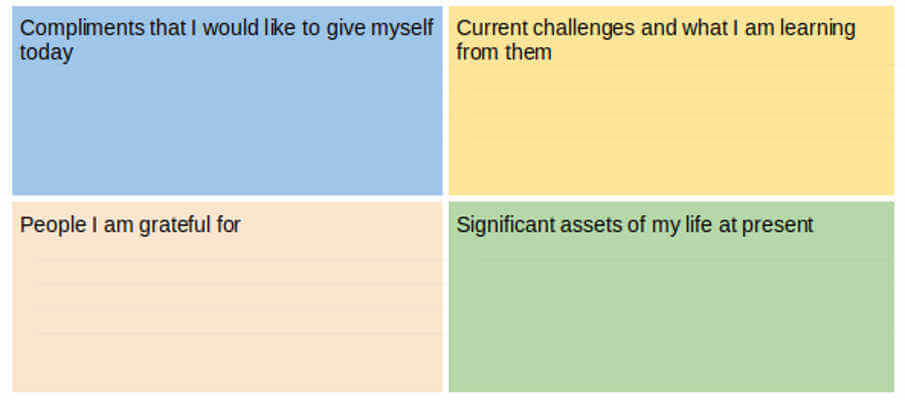
3. Gratitude Visits
We all take someone, whose unconditional back up and assist meant a lot to usa. Nosotros feel every bit if we 'owe' our happiness and success to them. If you lot have such a person, he/she might be your friend, family, or a professional associate, meet them once or twice a calendar month.
Initiate the plan, get and express your thankfulness i more time – allow the person feel important. Exchange some skillful memories and offer your support. In most cases, gratitude visits bring a feeling of sanctity and positivity instantly.
4. Do non hesitate to be happy
If yous experience happy, don't shy away from it. Remind yourself that you take worked difficult plenty to attain this and y'all truly deserve information technology. Be information technology a huge achievement or a small-scale success, acknowledge your joy and exist thankful for the moment. Accepting happiness makes us stronger and more grateful for what we accept. We learn to praise our efforts and prepare ourselves improve for facing difficulties in the future.
5. Notice a gratitude buddy
Discover a gratitude buddy for your daily practice – it can be your spouse, your kid, or your friend at work. Set aside some minutes everyday where you two (or more if you have more buddies) sit together and discuss the things yous are thankful for. Ask questions to each other and open up informally. Sharing thoughts of gratefulness with someone is a nifty way to sustain motivation strengthen your emotional skills.
Anxiety and Gratitude
Anxiety is our body's inbuilt wake-up phone call that alerts united states of america against danger. When fear sets in, our body releases hormones that create the fight or flight responses, and we react too. The brain doesn't get much time to analyze the correct or wrong when the adrenaline rush begins. The worst issue of feet is that it makes us experience insecure, and we start questioning our inner strengths. Eventually, coping mechanisms start failing.
In the book 'Grateful Brain,' author Alex Korb (2012) said that our encephalon is conditioned to part in a repeated way. For example, a person who worries likewise much nearly the agin outcomes will subconsciously re-wire his encephalon to process negative information just. Korb has mentioned that our mind cannot focus on positive and negative information at the same fourth dimension.
By consciously practicing gratitude, we can railroad train the brain to attend selectively to positive emotions and thoughts, thus reducing feet and feelings of anticipation.
Recent Studies into Gratitude and Anxiety
 These findings got stronger validation subsequently a recent written report conducted on the human relationship between gratitude and death anxiety (Lau & Cheng, 2011).
These findings got stronger validation subsequently a recent written report conducted on the human relationship between gratitude and death anxiety (Lau & Cheng, 2011).
The experiment was conducted on 83 Chinese adults, aged above 60 years, who were divided into three groups. One of the three groups were asked to write gratitude notes and words of positivity, another was asked to write near their worries, and the third group was given a neutral job.
After task completion, the groups were exposed to stimuli arousing death feet, the inevitable fear that we all endure from.
Results showed that participants of the first grouping who wrote gratitude notes showed fewer symptoms of death anxiety than the other two groups. Re-test of the results showed that with a grateful attitude in life, we gain acceptance and become fearless of the futurity.
At a neurobiological level, gratitude regulates the sympathetic nervous system that activates our anxiety responses, and at the psychological level, it weather the brain to filter the negative ruminations and focus on the positive thoughts.
Considering of its implications in anxiety reduction, gratitude practices like journaling and group discussions are now a meaning part of mental health interventions and life coaching regimes.
Gratitude practices are particularly effective for treating phobias similar death anxiety, PTSD, social phobia, and nihilism.
Gratitude And Grief
"Gratitude makes sense of your past, brings peace for today, and creates a vision for tomorrow"
Melody B.
Hard as it may audio, but grieving with gratitude can bring in a ray of promise in the darkest times in life. Finding a reason to be thankful in days of despair may seem impossible. In her volume on gratitude and grief, Kelly Buckley (2017) mentioned how she establish the meaning of her hurting and her life after losing her 23-year old son.
While it is true that practicing gratitude makes u.s.a. resilient to negative emotions and distress, it cannot exist denied that mundane misfortunes are inevitable and are bound to touch on our well-beingness.
Grief Management With Gratitude
i. Cry your eye out
Crying doesn't make united states of america weak. Instead, it is an deed of acceptance and sensation of our emotions. We cry because we know how we are feeling and why we are feeling so. It gives a vent to the hurting and helps us to pace up and change our lives.
two. Collect the cleaved pieces
Grieving with gratitude lets u.s.a. appreciate the things that we still have. For example, for a person who just got fired from his job, thanking his family unit and friends, who stand by his side during the crunch, can help in reducing the pain. By consciously acknowledging their beloved and support, he can experience grateful and regain the motivation to look for other employment opportunities.
3. Ask for help
Do not hesitate to seek professional assist when all your coping mechanisms fail. Studies have shown that people who practice gratitude are more than willing to participate in counseling and therapy for managing their depression, and the prognosis is much brighter in such instances.
4. Go on a gratitude jar
Keep a glass jar or a transparent box and some small pieces of paper beside it. Have up ane paper everyday and write virtually ane thing that yous are grateful for today. It may be your family unit, expert health, loving friends, your home, or yourself for enduring so much – anything that made you feel blest that day. As the jar gets filled upwards, you lot will naturally feel more gifted and hopeful.
The grief may still be there, but yous will gain the strength to look beyond it.
The Relationship Between Resilience And Gratitude
Gratitude fosters adaptive coping mechanisms. By managing positive emotions like satisfaction, happiness, and pleasure, gratitude enhances our emotional resilience and builds our inner forcefulness to combat stress (Gloria & Steinhardt, 2016).
Psychologists Shai Davidai and Thomas Gilovich, in one of their papers, chosen the 'Headwinds/Tailwinds Asymmetry: An Availability Bias in Assessments of Barriers and Blessings' (2016) mentioned that we tend to focus more on the obstacles and difficulties of life because they demand some action. Nosotros have to fight and overcome them to get back the normal flow of life.
On the flip-side, we forget to attend to the better things in life because they are 'already at that place' and we don't take to do anything to brand them stay with us. Practicing gratitude, according to Gilovich, is the best way to remind ourselves of the things that give us the courage to move on in life.
Studies on Gratitude and Resilience
A cantankerous-exclusive written report published in the International Journal of Social Psychiatry plant a strong positive correlation betwixt gratitude, resilience, and feelings of happiness. The report was conducted on a big sample of the developed population, and statistical treatment showed that participants who felt more grateful and expert gratitude journaling, were found happier and emotionally stronger than others (McCanlies, Gu, Andrew, & Violanti, 2018).
An extension of the study on depressive patients showed that those who practiced gratitude exercises recovered presently and felt more motivated to bounce dorsum from their distress.
Building Resilience With Gratitude
Many psychologists believe that emotional resilience is an coaction of five components (McCullough & Witvliet, 2002):
- Social competence – The ability to stand out amid others and the urge to win a situation
- Problem-solving – The ability to focus on solutions and proactively human activity on them
- Autonomy – The motivation to exercise freedom and ask for information technology when required
- Forgiveness – The inner power to let go of something and motility on from there
- Empathy – The strength to feel others and look into the matter from their point of view.
Mod research and studies indicate that in that location is a 6th component to emotional resilience – gratitude. Gratitude builds emotional resilience by:
- Helping us to come across the positive things in life
- Fighting the negative ruminations and rebuilding pessimistic thoughts with optimistic ones
- Staying grounded and accept the nowadays state of affairs, even if that is a harsh reality
- Identifying and focusing only on solutions
- Maintain good health past regulating our metabolic functioning and by decision-making the hormonal imbalances
- Sustain relationships and appreciate people who are at that place for us. Every bit a result, we feel more loved, cared for, and more hopeful.
Simple Gratitude Practices For Building Emotional Resilience
ane. Meditation and breath control
Starting any gratitude practice with a brisk meditation and breath control session is a expert idea. Deep breathing and abiding focus permit the heed to settle down and gather itself. You feel more relaxed and more continued to yourself, and now is a skilful time to outset your practice.
Here is a ii-minute meditation session that you tin follow:
two. Gratitude listing
Much like the gratitude journal, the gratitude listing will help you come confront-to-face up with your blessings. Take a pen and paper (or your mobile notepad) and make a list of all those people who offered their support when you lot needed it the nearly. While you are writing, effort to revert to the days and feel the thankfulness in your eye once more. Once the listing is made, expect at it for 2 minutes and go back to work.
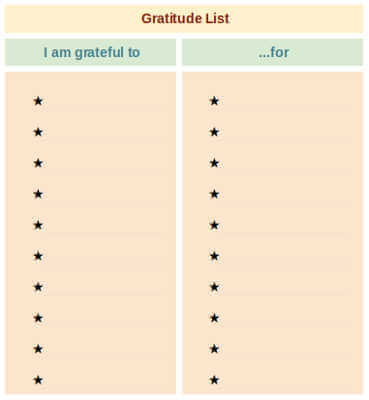
iii. Gratitude notes
In one case your gratitude listing is completed, start writing small cheers note to each of the people you lot mentioned in the list earlier. The notes can exist equally brusk every bit you want, but make sure yous are pouring your feelings into them. Send the messages to the people concerned – either as handwritten notes, or SMS, or emails. Just make sure your bulletin reaches them and do non expect responses.
4. Reminiscence Meditation
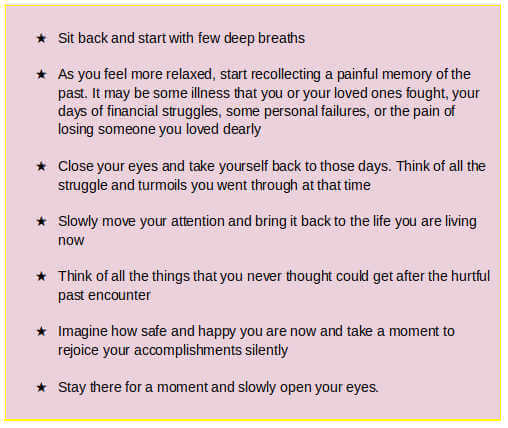
Notice how this makes you feel more grateful and beholden of the present. The time travel that nosotros do with this meditation instantly exposes us to our fortitude – nosotros showtime feeling more than confident of ourselves and gain the forcefulness to fight stress in the aforementioned way nosotros did before.
Gratitude and Stress
"God gave you a gift of 86400 seconds today. Have you used ane to say thank you?"
William Arthur Ward
Stress is our body'due south natural response to change – be that adept or bad. Positive stress or eustress brings us joy and is usually the least of our concerns. Unforeseen setbacks trigger negative stress or distress. We consider information technology as toxic and want to get rid of information technology.
Gratitude: A Natural Detox
Robert Emmons, a well-known mental health specialist, conducted several studies on stress and health which indicated that gratitude effectively releases stress hormones and increase positive emotions like happiness. Commitment to daily gratitude exercise reduces an array of negative emotions and is a natural stress detox for the mind and body.
Studies take indicated that people who experience more grateful to Him, are healthier and stress resilient in life (Krause, 2006). An experiment conducted on three groups of individuals, each team representing a particular age-group, revealed that older men and women felt more grateful to God for their lives, and scored a loftier stress-tolerance index than others.
Pause. Breathe. And appreciate
Gratitude is not a quick heal or an immediate relief for stress. Practicing gratitude doesn't mean that nosotros will be ever happy and delighted. Gratitude asks us to have that we are deplorable and focus on how to reduce it. We don't expect miracles when we write a gratitude journal; we just get a closer view of the right things that still be in life. The benefits of gratitude journaling are multifarious.
By being more grateful in the inside and expressing it on the exterior, we gain the power to combat and cope with the stress.
A Expect at Depression and Gratitude
"It is impossible to feel depressed and grateful at the same moment"
Naomi Williams
Dr. John Medina, in his bestseller project 'Encephalon Rules' mentioned how gratitude could be an eyeopener in depression times. He indicated that past looking around and acknowledging the back up that we take right now, nosotros tin can successfully shift focus from our burdens to the blessings we take.
Depression has a psychological and a neurochemical base of operations – both of which tin be addressed by gratitude. By displacing our attention from bug to solutions, gratitude practices hitting the serotonin, dopamine, and oxytocin – neurotransmitters that brand usa feel practiced (Burton, 2020). With the surge of these chemicals in the encephalon, the aloofness gets curbed away, and nosotros revive the motivation that depression had sucked away.
Gratitude and appreciation is entwined with numerous benefits including enhanced mood and self-esteem (Killen & Macaskill, 2015). Gratitude as an intervention for treating depression is convenient, less time-consuming, less expensive, and useful for the long-term (Mills et al., 2015).
Gratitude exercises for dealing with low
Sansone and Sansone (2010), has suggested three gratitude practices that work all-time with depression and grief (encounter Grief Counseling Techniques).
1. Gratitude Periodical
As mentioned earlier, keeping a journal where you write about all the people and things in life you are grateful for, can make a remarkable difference in your mental state. We know how a gratitude journal looks similar. Here are some tips on how to prepare and maintain one:
- Commit to daily practice.
- Set bated some time (for example early in the forenoon or correct before bedtime) and periodical your gratitude the same time everyday.
- Become through the previous pages and recollect the good things that happened to you lot in the by.
- When filling the journal, try to be as detailed as you can. Record every little affair associated with the person or the incident yous are offering your gratitude to.
- Make your journal bonny. Utilize colorful pens, stickers, or craft papers to give the gratitude journal an exciting look. Make the journaling more of an experience rather than a daily do.
2. Gratitude Assessments
Cocky-assessments similar GQ-6 (McCullough, Emmons, & Tsang, 2002) or the Gratitude Assessment (Hardy, 2010) can be a skilful way of evaluating how grateful we feel from the inside. Besides gaining insight on our level of gratitude, gratitude assessments increase sensation and present to us the assortment of possibilities to deal with our stress and negativities.
Y'all can likewise have the Gratitude Quiz developed by Mitchel Adler and Nancy Fagley (2005), which gives an accurate judge of what we are grateful for in life and how we can cultivate the mind to extract gratitude from the kindness we receive.
3. Gratitude Meditation
Gratitude meditation is a uncomplicated grounded technique to resonate our thoughts and feelings on all the people, situations, and things that we are truly grateful for. Through gratitude meditation, we choose to focus on ourselves (our achievements, our talents, our feelings at the moment) and on the globe (our family unit, friends, and everyone else who unconditionally honey and support usa).
It enhances perspective, clarifies vision, and frees the states from the burden of stress and burnout almost immediately.
Here is a guided gratitude meditation practice that you tin can follow:
How Does Gratitude Touch on Mental Health?
"But I know that I spent a long time existing, and now I intend to live"
Sabaa Tahir
Stress does not have to control our lives when nosotros feel and limited gratitude regularly. There is no part of well-being that is untouched by gratitude, be that physical, mental, or social.
Practicing gratitude is gaining a life-view of thankfulness. By appreciating ourselves, our honey ones, Nature, and the Almighty, nosotros experience the purest course if all positive emotions. Information technology helps u.s. to realize that cypher is obvious and zip is to exist taken for granted – for it is the petty things in life where our real joy lies.
Dr. Emmons, in his studies on the striking furnishings of gratitude on mental health revealed:
- Gratitude practices reduce cardiac diseases, inflammations, and neurodegeneration significantly
- Daily journaling and gratitude jars can help individuals fighting with depression, feet, and exhaustion
- Writing gratitude letters brings hope and evokes positivity in suicidal patients and those fighting terminal diseases
- Gratitude improves the sleep-wake cycle and enhances mood. It helps people with insomnia, substance corruption, and eating disorders.
A Accept-Habitation Bulletin
Practicing gratitude is synonymous to expressing our feelings for others and ourselves. By simple words of love and praise, we not only brand others experience expert, but nosotros also feel a lot meliorate of ourselves and our lives. Gratitude is about feeling the right mode, about the correct things, and at the right fourth dimension. It is inseparably linked with cocky-subject and motivation.
It may not give usa instant relief from pain and stress, just it brings the feeling of control back to u.s.a..
Past acknowledging and appreciating our avails, gratitude gives united states the accuse of our own lives. As Robin Sharma has beautifully put it:
"Gratitude drives happiness. Happiness boosts productivity. Productivity reveals mastery. And mastery inspires the globe".
For further reading:
- The Gratitude Tree for Kids (Incl. Activities + Drawings)
We hope you enjoyed reading this article. Don't forget to download our three Grief Exercises [PDF] for free.
- Adler, M. One thousand., & Fagley, N. S. (2005). Appreciation: Individual differences in finding value and meaning as a unique predictor of subjective well‐beingness. Journal of Personality, 73(1), 79-114.
- Algoe, South. B. (2012). Discover, remind, and bind: The functions of gratitude in everyday relationships. Social and Personality Psychology Compass, 6(6), 455-469.
- Algoe, S. B., Haidt, J., & Gable, S. Fifty. (2008). Beyond reciprocity: Gratitude and relationships in everyday life.Emotion,8(iii), 425-429.
- Buckley, 1000. Southward. (2017). Gratitude in grief: Finding daily joy and a life of purpose following the death of my son. North Charleston, SC: Kelly S. Buckley.
- Burton, Fifty. R. (2020). The Neuroscience and positive impact of gratitude in the workplace. American Clan for Physician Leadership. Retrieved from https://www.physicianleaders.org/news/the-neuroscience-and-positive-impact-of-gratitude-in-the-workplace
- Chesterton, G. K. (1986). The collected works of GK Chesterton (Vol. 20). San Francisco, CA: Ignatius Press.
- Davidai, S., & Gilovich, T. (2016). The headwinds/tailwinds asymmetry: An availability bias in assessments of barriers and blessings. Periodical of Personality and Social Psychology, 111(6), 835-851.
- Emmons, R. A., & McCullough, Yard. E. (2003). Counting blessings versus burdens: An experimental investigation of gratitude and subjective well-being in daily life. Journal of Personality and Social Psychology,84(2), 377-389.
- Emmons, R. A., & McCullough, 1000. E. (2004). The psychology of gratitude (Series in affective scientific discipline). New York, NY: Oxford University Printing.
- Emmons, R. A., & McNamara, P. (2006). Sacred emotions and melancholia neuroscience: Gratitude, costly signaling, and the brain. In P. McNamara (Ed.), Where God and scientific discipline meet: How brain and evolutionary studies alter our agreement of religion (pp. eleven-30). Westport, CT: Praeger.
- Gloria, C. T., & Steinhardt, M. A. (2016). Relationships among positive emotions, coping, resilience and mental wellness. Stress and Health, 32(2), 145-156.
- Gordon, A. K., Impett, E. A., Kogan, A., Oveis, C., & Keltner, D. (2012). To have and to hold: Gratitude promotes relationship maintenance in intimate bonds. Journal of Personality and Social Psychology, 103(2), 257-274.
- Hardy, D. (2010). The compound issue. Philadelphia, PA: Vanguard Press.
- Killen, A., & Macaskill, A. (2015). Using a gratitude intervention to enhance well-beingness in older adults. Periodical of Happiness Studies, 16(4), 947-964.
- Korb, A. (2012). The grateful brain. Psychology Today. Retrieved from https://www.psychologytoday.com/au/web log/prefrontal-nudity/201211/the-grateful-encephalon
- Krause, N. (2006). Gratitude toward God, stress, and health in tardily life. Research on Crumbling, 28(2), 163-183.
- Kumar, A., & Epley, N. (2018). Undervaluing gratitude: Expressers misunderstand the consequences of showing appreciation. Psychological Science, 29(ix), 1423-1435.
- Lau, R. Westward., & Cheng, Due south. T. (2011). Gratitude lessens death anxiety. European Journal of Ageing, eight(3), 169-175.
- McCanlies, Due east. C., Gu, J. K., Andrew, M. Due east., & Violanti, J. Thou. (2018). The issue of social back up, gratitude, resilience and satisfaction with life on depressive symptoms among police force officers post-obit Hurricane Katrina. International Journal of Social Psychiatry, 64(1), 63-72.
- McCraty, R., & Childre, D. (2004). The grateful heart: The psychophysiology of appreciation. In R. A. Emmons & M. East. McCullough (Eds.), Series in affective science. The psychology of gratitude (pp. 230–255). New York, NY: Oxford University Press.
- McCullough, G. E., Emmons, R. A., & Tsang, J. A. (2002). The grateful disposition: A conceptual and empirical topography. Journal of Personality and Social Psychology, 82(1), 112-127.
- McCullough, M. E., Kimeldorf, Thousand. B., & Cohen, A. D. (2008). An adaptation for altruism: The social causes, social effects, and social development of gratitude. Current Directions in Psychological Science, 17(4), 281-285.
- McCullough, Thousand. Due east., & Witvliet, C. Five. (2002). The psychology of forgiveness. In C. R. Snyder & S. J. Lopez (Eds.), Handbook of positive psychology (pp. 446-458). New York, NY: Oxford University Press.
- Mills, P. J., Redwine, L., Wilson, K., Pung, Chiliad. A., Chinh, K., Greenberg, B. H., … & Chopra, D. (2015). The role of gratitude in spiritual well-being in asymptomatic heart failure patients. Spirituality in Clinical Practice, 2(1), 5-17.
- Moll, J., Zahn, R., de Oliveira-Souza, R., Krueger, F., & Grafman, J. (2005). The neural basis of human being moral cognition. Nature Reviews Neuroscience, half dozen(10), 799-809.
- Russell, E., & Fosha, D. (2008). Transformational affects and core state in AEDP: The emergence and consolidation of joy, promise, gratitude, and confidence in (the solid goodness of) the self. Journal of Psychotherapy Integration, 18(two), 167-190.
- Sansone, R. A., & Sansone, Fifty. A. (2010). Gratitude and well being: The benefits of appreciation. Psychiatry (Edgmont), 7(xi), 18-22.
- Seligman, M. E., Steen, T. A., Park, N., & Peterson, C. (2005). Positive psychology progress: Empirical validation of interventions. American Psychologist, lx(five), 410-421.
- Wood, A. M., Maltby, J., Stewart, N., Linley, P. A., & Joseph, S. (2008). A social-cerebral model of trait and state levels of gratitude.Emotion,8(ii), 281-290.
- Zahn, R., Garrido, G., Moll, J., & Grafman, J. (2014). Individual differences in posterior cortical volume correlate with proneness to pride and gratitude. Social Cognitive and Melancholia Neuroscience, 9(11), 1676-1683.
- Zahn, R., Moll, J., Iyengar, V., Huey, E. D., Tierney, M., Krueger, F., & Grafman, J. (2009). Social conceptual impairments in frontotemporal lobar degeneration with right anterior temporal hypometabolism. Brain, 132(3), 604-616.
- Zahn, R., Moll, J., Krueger, F., Huey, Due east. D., Garrido, One thousand., & Grafman, J. (2007). Social concepts are represented in the superior anterior temporal cortex. Proceedings of the National University of Sciences, 104(15), 6430-6435.
- Zahn, R., Moll, J., Paiva, M., Garrido, One thousand., Krueger, F., Huey, Due east. D., & Grafman, J. (2009). The neural basis of human social values: Bear witness from functional MRI. Cerebral Cortex, nineteen(2), 276-283.
Source: https://positivepsychology.com/neuroscience-of-gratitude/
0 Response to "I Always Feel Happy You Know Why Tell Me Onde Again Why You Cant Work"
Post a Comment